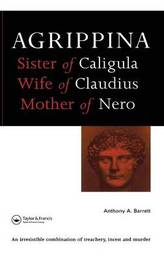
|
Agrippina: Mother of Nero
Hardback
Main Details
| Title |
Agrippina: Mother of Nero
|
| Authors and Contributors |
By (author) Anthony A. Barrett
|
| Series | Roman Imperial Biographies |
|---|
| Physical Properties |
|
| ISBN/Barcode |
9780713468540
|
| Classifications | Dewey:937.07092 |
|---|
| Audience | | Undergraduate | | Postgraduate, Research & Scholarly | | Professional & Vocational | | General | |
|---|
|
Publishing Details |
| Publisher |
Pavilion Books
|
| Imprint |
Batsford Ltd
|
| Publication Date |
5 June 1996 |
| Publication Country |
United Kingdom
|
Description
Agrippina the Younger attained a level of power in first-century Rome unprecedented for a woman. According to ancient sources, she achieved her success by plotting against her brother, the emperor Caligula, murdering her husband, the emperor Claudius, and controlling her son, the emperor Nero, by sleeping with him. Drawing on the latest archaeological, numismatic, and historical evidence, Barrett argues that Agrippina has been misjudged. Although she was ambitious, she made her way through ability and determination rather than by sexual allure, and her political contributions to her time seem to have been positive. After Agrippinas marriage to Claudius there was a marked decline in the number of judicial executions and there was close co-operation between the Senate and the Emperor. The settlement of Cologne, founded under her aegis, was a model of social harmony. The first five years of Neros reign, while she was still alive, were the most enlightened of his rule. According to Barrett, Agrippinas one failing was her relationship with her son, the monster of her own making, who had her murdered in horrific and violent circumstances. In this provocative and stimulating biography - the first on Agrippina in English - Anthony Barrett paints a startling new picture of this influential woman.
Author Biography
Anthony Barrett is Professor of Classics at the University of British Columbia in Vancouver. He studied at the Universities of Oxford, Durham and Toronto and has written extensively in the field of classical antiquity.
|